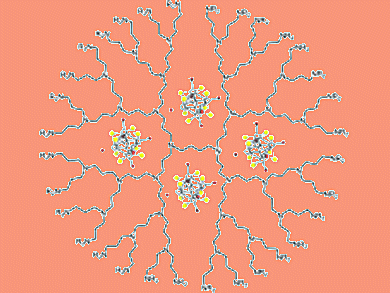A team of scientist around Holger Stephan, Forschungszentrum Dresden-Rossendorf, Institute of Radiopharmacy, Dresden, Germany, has studied the encapsulation and release of nanometer-sized anionic rhenium cluster complexes in biocompatible maltose-decorated dendrimers. They have shown that sugar-capped POPAM dendrimers are well suited to encapsulate and slowly release nanosized guest molecules, such as the anionic hexanuclear rhenium cluster complexes.
Results obtained from time-resolved laser fluorescence spectroscopy indicate that guest molecules are partially de-solvated during the process of inclusion.
These and other features described by the authors may be utilized for the development of novel drug-delivery
systems. The synthetic pathway conveniently allows the modification of dendrimer surfaces with additional biologically
active molecules, hence offering great potential for using such dendritic nanocontainers for targeting in vivo.
- Sugar-Decorated Dendritic Nanocarriers: Encapsulation and Release of the Octahedral Rhenium Cluster Complex [Re6S8(OH)6]4–,
Manja Kubeil, Holger Stephan, Hans-Jürgen Pietzsch, Gerhard Geipel, Dietmar Appelhans, Brigitte Voit, Jan Hoffmann, Bernhard Brutschy, Yuri V. Mironov, Konstantin A. Brylev and Vladimir E. Fedorov,
Chem. Asian J. 2010, 12 (5), 2507–2514.
DOI: 10.1002/asia.201000284



